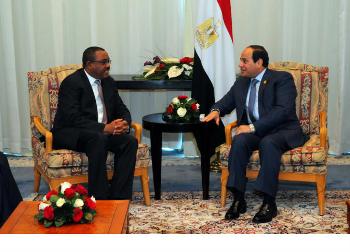Egyptian president to visit Ethiopia to press for changes in proposed dam agreement: report
March 19, 2015 (KHARTOUM) – The Egyptian president Abdel Fattah el-Sisi will travel to Addis Ababa on Monday for talks with Prime Minister Hailemariam Desalegn on the Grand Ethiopian Renaissance Dam (GERD), a newspaper reported today.

Among the changes proposed are inclusion of clauses that guarantee Egypt’s historical rights in the Nile waters and seeking a reduction the dam’s storage capacity.
It recalled that the Egyptian leader called for revising the accord during his meeting this week with his ministers of foreign affairs, irrigation and water resources, international cooperation as well as head of intelligence.
The leaders of Sudan, Egypt and Ethiopia were scheduled to be in Khartoum on Monday for a signing ceremony of an accord on a mechanism for operating GERD.
Sudanese foreign minister Ali Karti described this event as “historic” that will be attended by officials from several neighboring and friendly countries.
Karti further said that this accord will form the basis of future detailed agreements that will be negotiated.
It Is not clear now if the signing will still take place in Khartoum as several other Egyptian newspapers mentioned that el-Sisi’s three-day visit will witness signing of the GERD agreement between the three countries.
This is believed to be the first state visit by an Egyptian leader to Ethiopia in decades.
This month, foreign affairs and water resources ministers of the three nations reached a preliminary draft agreement on GERD following three-day meetings in Khartoum.
The three countries formed a committee to select a consultancy firm to assess the likely impact of GERD on Sudan and Egypt. Four consultancy firms from France, Australia and Holland had earlier been shortlisted and invited to submit their proposals.
Egypt fears the dam will negatively affect its traditional share of water from the Nile, its only source of water which has been determined by a colonial-era water-sharing treaty.
Ethiopia, for its part, says the project is indispensable to its own national development and the economic welfare of its burgeoning population.
(ST)
